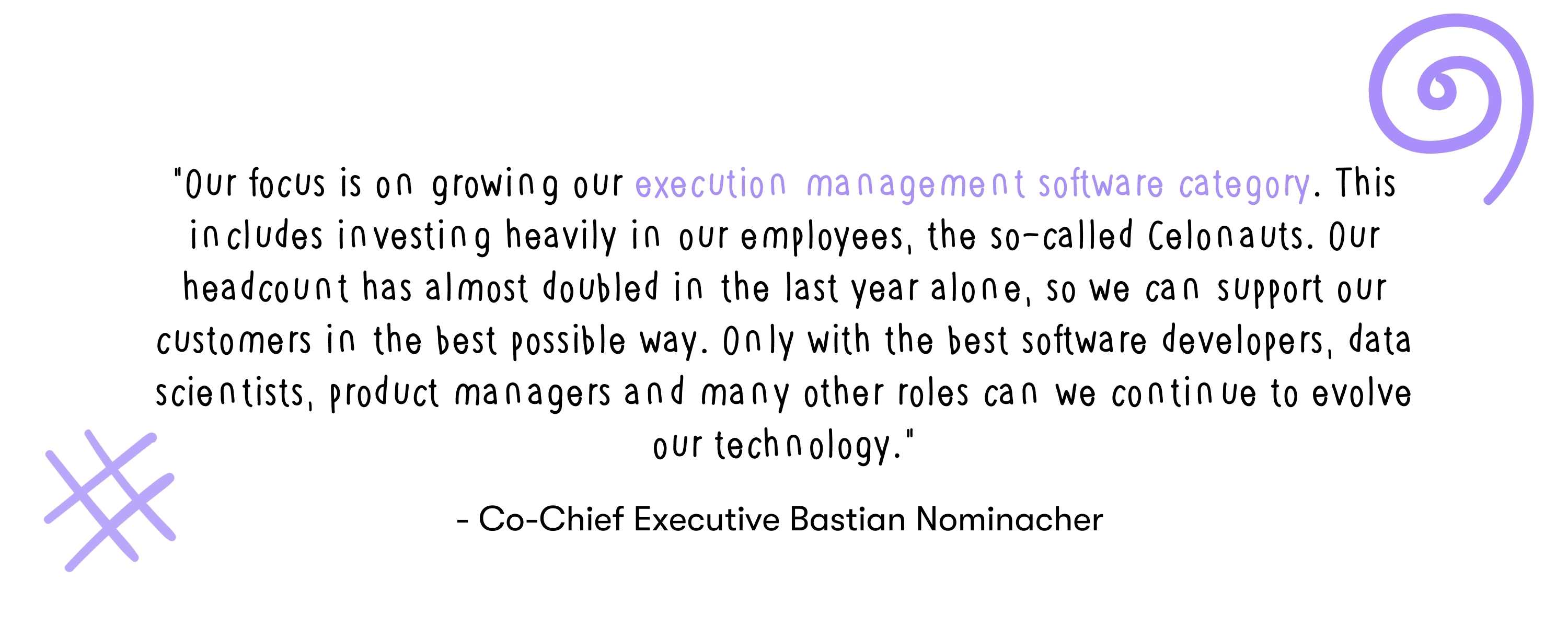The news that Celonis has raised $1 billion in a funding round has quite startled the industry. It wasn't just the amount of funding that caused a stir, but above all the resulting valuation of Celonis. With a valuation of the company at more than 11 billion US dollars, Celonis has risen to become the first German Decacorn. Decacorn is the term used to describe newly founded companies that are valued at more than ten billion outside the stock market. However, it is more than questionable whether the company founded in 2011, which had already been valued at more than one billion dollars in 2018 and thus received "Unicorn" status, can still be called a start-up today.

Outgrowing the startup shoes
Because Celonis, which has made profits from day one and is growing in the triple digits year after year, did not need this round of financing. In 2016 and 2018, the Munich-based company was already able to raise around $80 million from two rounds of investors, which flowed into expansion in the US and further development of the software. In addition, Celonis says it now already employs 1,300 people in Munich, New York and more than 15 other offices worldwide, has implemented its software more than 2,000 times and is the market leader in process mining with a 90% market share, according to Gartner. A pioneer in the Process Mining category, Celonis was the first company to develop the ability to automatically mine process problems 10 years ago.
At the heart of the technology trend
Process Mining is a process management technique. It aims to discover, monitor and improve process flows by extracting readily available knowledge from information systems event logs. Process mining provides companies with complete visibility into how they really operate. With these insights, companies can then identify opportunities for Process Optimization.
If market researchers are to be believed, golden times are dawning for process mining. According to the SPARK Matrix Report: Process Mining 2020, the global process mining market will grow from $245 million in 2019 to $7.11 billion by 2025, a compound growth rate of 75 percent. But for Alexander Rinke, co-CEO and co-founder of Celonis, the huge interest in the market's potential goes beyond process mining:
"Process mining, where we're coming from, is really just the gateway to building new processes and better processes for companies, and if you think about it, that's a much bigger market that we're addressing."
In doing so, Celonis sits uniquely at the center of this technology trend, as without functioning processes, data-driven, intelligent execution of digital transformation would be compromised.
Keeping an eye on the EMS market
But that's not enough for the company. Celonis is using this foundation to pioneer the execution management industry and transform business processes. It's been less than six months since Celonis launched Execution Management System (EMS). EMS enables companies to manage business processes entirely based on data and intelligence. Ultimately, the goal is to overcome the fundamental limitations of executing business processes through a complex set of legacy and fragmented transactional systems. In other words, Celonis no longer just offers analysis of processes, but also their active control.
A first strong sign
To that end, Celonis last October acquired Make (Formerly Integromat), the leading cloud-based automation platform that combines applications and services with powerful, code-free integrations to automate online workflows. To be sure, it will take some work to mold this into a unified solution. And whether Celonis has laid the foundation for an execution management industry with this, only the future will tell. However, it is a strong and powerful sign for the automation industry. It shows the direction in which the automation industry is heading. Complete packages from analysis to control and optimization to automation of business processes (with technologies such as Robotic Process Automation (RPA) or iPaaS) - according to the motto Execution Management from a single source - make such solutions highly interesting for every potential customer and increase the pressure on all market participants.

Head to head with UiPath
Looking at the development of UiPath, which already acquired Press Gold in October 2019 and integrated process mining into its offering as UiPath, the path Celonis has taken seems only logical if it wants to play in the concert of the big players. Combining process mining with Robotic Process Automation (RPA) not only improves the market position, but also increases the market power of the providers of such complete solutions. Celonis' move to EMS has the potential to change market structures and establish Celonis and UiPath as the two big players in the automation environment.
Microsoft is in on the action
Nevertheless, it would be a strategically serious faux pas to lose sight of Microsoft. By integrating Process Advisor, Microsoft has also breathed process mining capabilities into its Power Automate Platform. With its various partnerships - including FortressIQ (with a process intelligence platform), Blueprint Software Systems (developer of intelligent automation systems) and PAFNow (leader in process mining) - Microsoft has long understood that technologies such as AI (artificial intelligence) and process mining are becoming key drivers of automation and, for its part, has also already thrown its hat into the ring.
Thinking strategically outside the box
The deal with IBM once again shows that Celonis is not sitting behind the stove, but is thinking strategically with great foresight. As part of the partnership, IBM wants to sell Celonis products to its customers. In addition, IBM wants to train 10,000 consultants worldwide to be able to use the Celonis tools. Celonis thus opens the door to a massive sales and consulting force, while IBM gains a deep understanding of a technology that is at the beginning of any workflow automation chain. By integrating Celonis with Red Hat OpenShift, the Celonis solution can operate in a hybrid cloud world and leverage the power of OpenShift, which can span the worlds of mainframe, private cloud and public cloud.
The accolade
The pulling power of a name like IBM alone should not be underestimated, and could be at least part of the reason why investors were willing to pump so much capital into the company. For Celonis, the deal is like a knighthood. It makes it clear to the other big software company from Walldorf, SAP, that Celonis is an absolute heavyweight in the process mining market, which is ahead with its specific focus. Setting a strong example here with the help of IBM is important if only because SAP only recently bought Signavio, a direct competitor of Celonis, for a billion and both together are deeply anchored in many companies. Celonis' confidence that it has backed the right horse with its EMS is also demonstrated by the announcement of the $10 Million Dollar Execution Capacity Challenge at Celosphere, in which Celonis will either find $10 million in buried capacity or donate $100,000 to charity.
Where to put the giant investment?
But at the end of the day, the question on everyone's mind is, what do you do with this huge investment? In general, it's no secret that you have to put money in your hand if you want to tackle the development of a market as large as that of process automation. After all, Celonis has only tapped a fraction of the market potential today. But Celonis clearly has pretty clear ideas for how to use it. Of course, that includes continuing to drive product development and innovation to help companies deploy data-driven intelligent execution management systems. Buying additional platforms or smaller vendors, to the extent they add value, is also not ruled out, but is not a top priority. This is in stark contrast to staffing and recruitment, which, if co-chief executive Bastian Nominacher (podcast episode #25: The Unicorn Celonis with Bastian Nominacher) is to be believed, is very close to Celonis' heart:

An IPO is only part of the dream for Alexander Rinke, Co-Founder and Co-CEO, but not as exciting a goal as achieving the carbon-neutral status Celonis has promised. But in general, Celonis is not expected to continue operating as frugally as it has in the past and is more likely to invest heavily in its sales and sales support teams.
Reinforcement with vision and experience
It should also be no coincidence that just as Celonis is raising another $1 billion in a third round of funding, a technology industry veteran, former high-ranking Wall Street analyst and responsible for the finances of Google's flagship advertising business at Google, Carlos Kirjner, is joining Celonis as Chief Financial Officer. As part of the executive management team, Kirjner will be responsible for the global finance organization and strategy. Kirjner's proven track record and foresight to identify industry trends long before others did the trick. For Bastian Nominacher, co-CEO and co-founder of Celonis, he has "the vision and experience to drive our ambitious goals of being a category-defining company designed for long-term growth and impact."
Conclusion
The secret to Celonis' success lies in the direct link companies can draw between its software tools and productivity improvements that save millions. But the company is also aiming for a more actionable level of its tools, providing users with a comprehensive, real-time dashboard of their processes, with the ability to analyze processes and directly enforce and automate recommended improvements or changes. This puts Celonis squarely on course in the automation race, no doubt occupying the pool position along with UiPath. The remaining field of process mining and automation providers is currently still very confusing and it will be interesting to see how, where and in which constellation the market players will position themselves in order to be able to keep up with the pace set by Celonis and UiPath in the new field of execution management systems.









